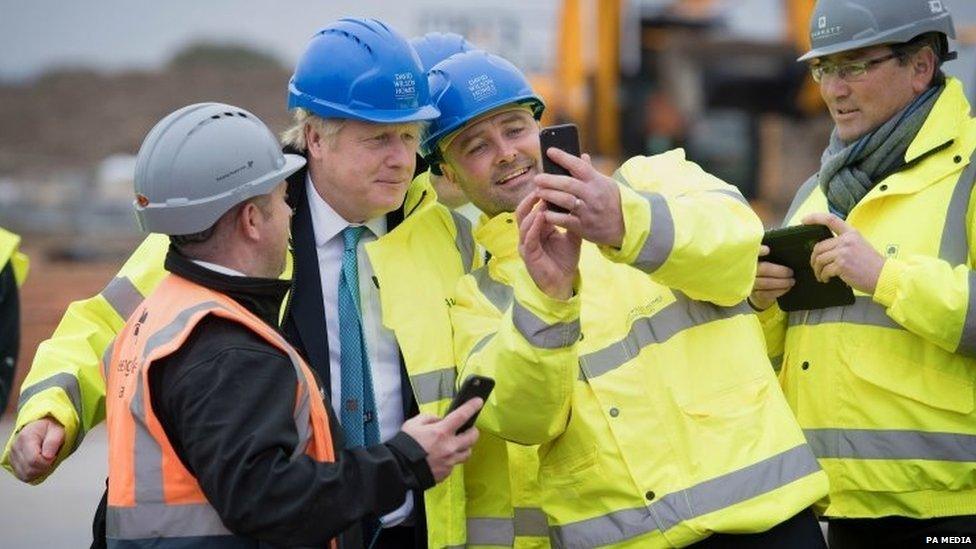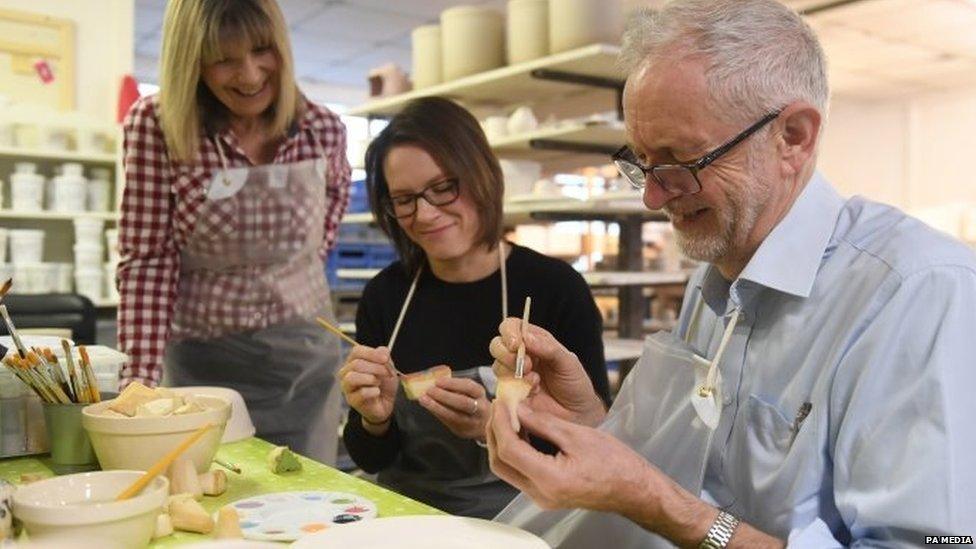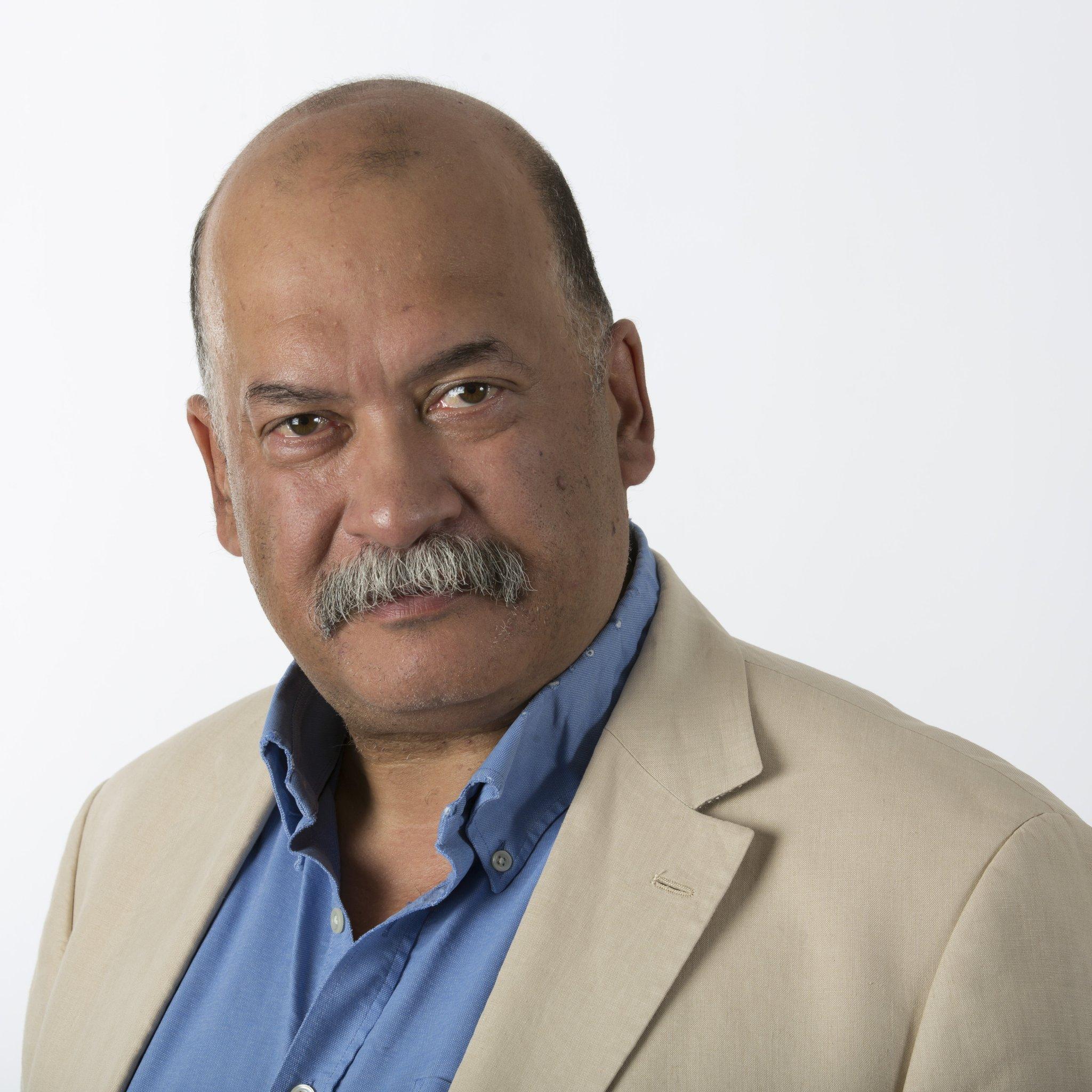General election 2019: Flamboyant pledges fight a tide of public distrust
- Published

Watching Boris Johnson and Jeremy Corbyn do what they both do best - campaigning as if was a performing art - ought to have been a bit of a treat for politics watchers this week.
But it wasn't.
The pledges were flamboyant: tax cuts from the PM on Wednesday, huge public spending hikes from Labour's leader on Thursday; then, on Friday, on the BBC Question Time set in Sheffield, a live audience showed vividly how public distrust had risen like a flood tide.
In that moment, the two leaders' talent for crowd-pleasing seemed more like a survival skill.
To a neutral observer, it might have been fascinating yet strangely uncomfortable to witness: like watching synchronised swimming in a tsunami.

Jo Swinson, the Lib Dem leader, was given a tough time too.
Her party's anti-Brexit policy is, after all, meant to polarise opinion. In Sheffield, she was duly criticised as anti-democratic by a Leave voter, and then moments later by a Remainer.
But so far at least, according to the polls, the Lib Dem store of support from pro-remain Labour and Tory converts seems to have shrunk slightly and not grown.
This week, the Lib Dems subtly toned down the talk of Jo Swinson as the UK's next prime minister, and talked up the likelihood of her becoming "King-maker" in a hung Parliament.
That's maybe more realistic. And believable.
Watch highlights from the Question Time leaders' special
Ms Swinson's ruled out any coalition with anyone. But given the content of the Liberal Democratic manifesto which was published on Wednesday, it's hard to see how the party could collaborate with either the Tories or Labour at all, however loosely.
Boris Johnson's ruled out another Brexit extension, which opens the possibility of a no-deal Brexit next year (though he denies it). Jeremy Corbyn's now committed himself to a position of neutrality in any future Brexit referendum.
On public spending and borrowing, the Lib Dems have adopted a more fiscally cautious position than even the Tories.
Take the Lib Dem manifesto and rhetoric at face value, and an inconclusive election result might well lead to yet another election sooner rather than later.
As for the SNP just now, Nicola Sturgeon looks like the only leader among the main parties represented at Westminster who can look ahead to polling day with genuine confidence.
Even she had tough questions to answer this week.
Why, for example, should one more referendum be enough to secure Scottish independence when she argues, at the same time, that Brexit needs another to confirm the verdict of 2016?
In Sheffield, she told the audience Brexit had been messed-up.
Talks with London on the terms of Scottish independence, apparently, would be much more straightforward.
I know of plenty of independent experts who rather doubt that.

CONFUSED?: Our simple election guide, external
POLICY GUIDE: Who should I vote for?, external
REGISTER: What you need to do to vote

The Greens and Plaid Cymru were also busy this week, plugging their plans to resist climate change, and promote clean energy.
They can celebrate that the issue has risen dramatically in prominence, then mourn the fact it's so often been drowned out by the row over Brexit.
Route maps
All the the leaders have started racking up their campaign mileage allowances.
The route maps have been revealing. Boris Johnson visited only one remain-voting seat before Friday, compared to Jeremy Corbyn's 12.
Jo Swinson, clearly targeting Labour seats, went to eight of them in nine visits. Nicola Sturgeon seems to be hunting for votes in Tory territory, five Conservative constituencies on her itinerary so far.
And as for Nigel Farage, as he launched his party's "Contract with the voters", he reminded us the Brexit Party has no intention of going away, much as Boris Johnson might wish they would.
A senior member of the party hierarchy (not Nigel Farage, though there aren't many of them) told me he believed a hung Parliament might deliver another opportunity to force the Tories into an electoral pact in the subsequent general election.
Who knows?
Certainly, Nigel Farage didn't look like a waning political force this week.
He never does, does he?
